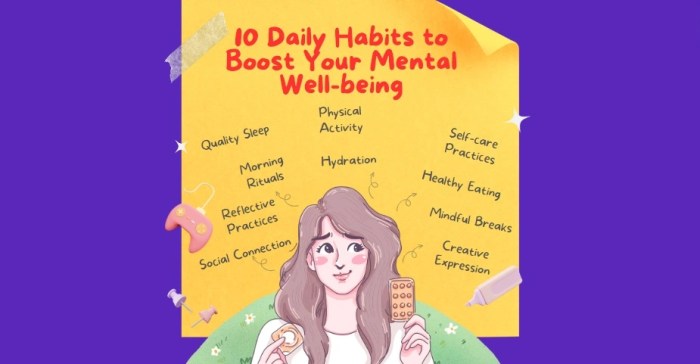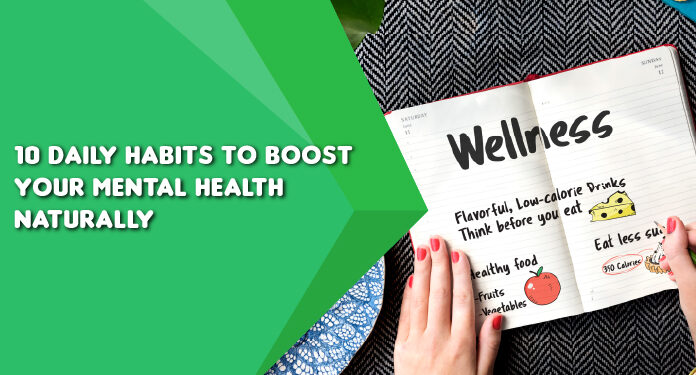
Embark on a journey towards better physical and mental well-being with these 10 daily habits. Discover how simple yet effective practices can transform your overall wellness, paving the way for a healthier and happier life.
10 Daily Habits to Boost Your Physical and Mental Wellness
Maintaining a healthy lifestyle is crucial for overall well-being, both physically and mentally. By incorporating these 10 daily habits into your routine, you can significantly improve your quality of life.
1. Exercise Regularly
Regular physical activity not only helps in maintaining a healthy weight but also releases endorphins that elevate mood and reduce stress levels.
2. Prioritize Sleep
Adequate sleep is essential for cognitive function and emotional well-being. Aim for 7-9 hours of quality sleep each night to recharge your body and mind.
3. Stay Hydrated
Drinking enough water throughout the day helps in maintaining proper bodily functions, improving concentration, and boosting energy levels.
4. Practice Mindfulness
Engaging in mindfulness activities such as meditation or deep breathing exercises can help reduce anxiety, increase self-awareness, and promote emotional balance.
5. Eat a Balanced Diet
Consuming a variety of nutrient-rich foods provides essential vitamins and minerals that support brain function and overall physical health.
6. Limit Screen Time
Excessive screen time can negatively impact mental health. Set boundaries for screen use to reduce eye strain, improve sleep quality, and enhance real-life social interactions.
7. Connect with Others
Building and maintaining relationships with friends, family, or a support network can improve mental well-being, reduce feelings of loneliness, and provide emotional support.
8. Practice Gratitude
Taking time to reflect on things you are grateful for can shift your focus to positive aspects of life, increase resilience, and improve overall happiness.
9. Get Fresh Air and Sunlight
Spending time outdoors, soaking in sunlight, and breathing fresh air can boost mood, enhance vitamin D levels, and reduce symptoms of depression.
10. Establish a Routine
Creating a daily routine that includes time for work, relaxation, hobbies, and self-care can provide structure, reduce stress, and promote a sense of accomplishment.
Regular Exercise
Regular exercise plays a crucial role in maintaining both physical and mental wellness. Engaging in daily physical activity can bring a wide range of benefits that contribute to an overall healthier lifestyle.
Benefits of Regular Exercise
- Improves cardiovascular health
- Strengthens muscles and bones
- Enhances flexibility and balance
- Boosts metabolism
- Helps in weight management
Simple Exercises for Daily Routine
- Brisk walking or jogging
- Bodyweight exercises like push-ups, squats, and lunges
- Yoga or stretching routines
- Dancing or aerobics
- Jumping jacks or skipping rope
Positive Impact on Mental Health
Regular exercise not only benefits the body but also has a positive impact on mental health. Physical activity releases endorphins, also known as "feel-good" hormones, which can help reduce feelings of stress, anxiety, and depression. Additionally, exercise promotes better sleep, increases focus and concentration, and boosts overall mood and self-esteem.
Healthy Eating Habits
Eating a balanced diet is crucial for maintaining both physical and mental wellness. The food we consume directly impacts our energy levels, mood, and overall health. By making healthier food choices and following a well-rounded meal plan, you can significantly boost your well-being.
Meal Prepping for Success
Meal prepping is a great way to ensure you have nutritious meals ready to go, especially during busy days. By setting aside time to plan and prepare your meals in advance, you can avoid unhealthy food choices and stay on track with your wellness goals.
- Plan your meals for the week ahead to avoid last-minute unhealthy decisions.
- Include a variety of fruits, vegetables, whole grains, lean proteins, and healthy fats in your meal prep.
- Invest in quality food storage containers to keep your prepped meals fresh and easily accessible.
- Use herbs, spices, and healthy sauces to add flavor to your meals without relying on excess salt or sugar.
The Link Between Nutrition and Mental Health
Nutrition plays a significant role in supporting mental health and cognitive function. Certain nutrients can impact neurotransmitter production, mood regulation, and overall brain health. By focusing on a diet rich in essential vitamins, minerals, and antioxidants, you can support your mental well-being.
- Omega-3 fatty acids found in fatty fish, flaxseeds, and walnuts can help reduce inflammation in the brain and support cognitive function.
- Consuming complex carbohydrates like whole grains, fruits, and vegetables can provide a steady source of energy for your brain and body.
- A diet high in antioxidants from colorful fruits and vegetables can protect your brain cells from oxidative stress and enhance cognitive performance.
- Probiotic-rich foods like yogurt, kefir, and sauerkraut can support gut health, which is linked to improved mood and mental well-being.
Sufficient Sleep
Getting an adequate amount of sleep each night is crucial for both physical and mental well-being. Sleep plays a vital role in various functions of the body, including memory consolidation, immune system support, and emotional regulation. Lack of sleep can lead to decreased cognitive function, increased stress levels, and a higher risk of developing health issues.
Improving Sleep Quality
- Avoid consuming caffeine or heavy meals close to bedtime.
- Create a relaxing bedtime routine, such as reading a book or taking a warm bath.
- Ensure your sleep environment is comfortable, quiet, and dark.
- Establish a consistent sleep schedule by going to bed and waking up at the same time every day.
Impact of Sleep on Cognitive Function and Emotional Well-being
Sleep plays a crucial role in cognitive function, affecting memory, concentration, and overall mental performance. A good night's sleep can enhance problem-solving skills and creativity. Emotionally, adequate sleep helps regulate mood and stress levels, promoting a more positive outlook on life.
Prioritizing sleep can lead to improved overall well-being and quality of life
.
Mindfulness and Meditation
Practicing mindfulness and meditation daily can have numerous benefits for both your physical and mental well-being. These practices can help reduce stress, improve focus, enhance self-awareness, and promote emotional regulation.
Benefits of Mindfulness and Meditation
- Reduced stress and anxiety levels
- Improved mental clarity and focus
- Enhanced self-awareness and emotional regulation
- Increased sense of calm and inner peace
- Improved overall well-being and quality of life
Techniques for Incorporating Mindfulness into Everyday Life
- Start your day with a short mindfulness meditation
- Practice mindful breathing throughout the day
- Acknowledge and accept your thoughts and emotions without judgment
- Engage fully in daily activities and tasks
- Take short mindfulness breaks to pause and reset
How Mindfulness Can Reduce Stress and Improve Mental Clarity
- Mindfulness helps you become more aware of your thoughts and emotions, allowing you to respond to stressors more effectively.
- Regular practice of mindfulness and meditation can rewire the brain, reducing the impact of stress on your mental and physical health.
- By cultivating a present-focused awareness, mindfulness can help clear mental clutter and improve cognitive function.
Hydration
Maintaining proper hydration is essential for both physical and mental well-being. Water plays a crucial role in various bodily functions, such as regulating body temperature, aiding digestion, and transporting nutrients. Dehydration can lead to fatigue, headaches, and even mood disturbances.
Significance of Staying Hydrated
- Water is necessary for the proper functioning of every cell in the body.
- Hydration supports cognitive function and concentration.
- Proper hydration can improve mood and reduce feelings of stress and anxiety.
- Drinking enough water helps in the elimination of toxins from the body.
Time Management and Prioritization
Effective time management is crucial for reducing stress and maintaining a healthy work-life balance. By prioritizing tasks and organizing your schedule efficiently, you can improve your mental wellness and overall quality of life.
Strategies for Effective Time Management
- Create a daily schedule or to-do list to prioritize tasks and allocate time for each one.
- Break down larger tasks into smaller, more manageable steps to avoid feeling overwhelmed.
- Avoid multitasking and focus on one task at a time to improve productivity and reduce stress.
- Use tools and technology such as calendar apps or task management software to stay organized and on track.
- Set realistic deadlines for tasks and avoid procrastination to prevent last-minute stress.
Tips for Prioritizing Tasks
- Differentiate between urgent and important tasks to focus on what needs immediate attention.
- Consider the impact and consequences of each task to prioritize effectively.
- Delegate tasks when possible to lighten your workload and free up time for more critical responsibilities.
- Reevaluate your priorities regularly and adjust your schedule as needed to ensure a healthy work-life balance.
Social Connections

Maintaining social connections is crucial for overall well-being as it plays a significant role in our mental and emotional health. Connecting with friends and family on a daily basis can have a positive impact on our mood, reduce feelings of loneliness, and provide a sense of belonging.
Ways to Stay Connected
- Regularly schedule phone calls or video chats with loved ones to catch up and stay in touch.
- Plan social activities such as virtual game nights, movie nights, or virtual workouts together.
- Join online communities or social groups based on shared interests to connect with like-minded individuals.
- Send thoughtful messages or letters to show you care and are thinking of them.
Personal Development and Learning
Continuous learning and personal growth are essential for boosting both physical and mental wellness. Engaging in activities that promote self-improvement can lead to increased self-esteem, a sense of accomplishment, and overall life satisfaction.
Benefits of Continuous Learning
- Stimulates brain function and cognitive abilities.
- Enhances problem-solving skills and creativity.
- Increases adaptability and resilience to change.
- Boosts confidence and self-awareness.
- Opens up new opportunities for personal and professional growth.
Daily Activities for Self-Improvement
- Reading books on a variety of topics to broaden knowledge.
- Taking online courses or attending workshops to learn new skills.
- Practicing a new hobby or creative outlet to stimulate the mind.
- Setting goals and tracking progress to stay motivated.
- Reflecting on experiences and learning from mistakes for personal growth.
Boosting Self-Esteem Through Learning
- Acquiring new skills and knowledge can build a sense of accomplishment and pride.
- Overcoming challenges and mastering new tasks can increase confidence levels.
- Setting and achieving learning goals can improve self-esteem and self-worth.
- Receiving recognition for learning achievements can positively impact mental wellness.
Gratitude Practice
Practicing gratitude involves acknowledging and appreciating the positive aspects of life, no matter how big or small. This practice has a profound impact on mental health and overall well-being by shifting focus from negativity to positivity.
Ways to Incorporate Gratitude Practice Daily
- Start a gratitude journal: Take a few minutes each day to write down things you are grateful for.
- Express gratitude to others: Say thank you, send a note, or show appreciation to friends, family, or colleagues.
- Practice mindfulness: Be present in the moment and cultivate gratitude for the little things around you.
Expressing Gratitude and Improving Well-Being
- Enhances mental health: Gratitude reduces stress, improves mood, and promotes emotional resilience.
- Strengthens relationships: Expressing gratitude fosters deeper connections and enhances social bonds.
- Promotes positive thinking: Gratitude helps shift focus from negative thoughts to positive ones, leading to a more optimistic outlook on life.
Epilogue
In conclusion, integrating these 10 daily habits into your routine can lead to profound improvements in both your physical health and mental well-being. By prioritizing self-care and consistency, you are investing in a brighter and more balanced future for yourself.
FAQ Compilation
How important is consistency in practicing these daily habits?
Consistency is key in reaping the long-term benefits of these habits. By making them a part of your daily routine, you can gradually observe positive changes in your physical and mental well-being.
Can these habits be tailored to suit individual lifestyles?
Absolutely! These habits are versatile and can be adjusted to fit your unique schedule and preferences. The key is to find what works best for you and incorporate them into your daily life.
Is it necessary to follow all 10 habits strictly?
While incorporating all 10 habits can yield comprehensive benefits, you can start by focusing on a few that resonate with you the most. Gradually adding more habits over time can also be beneficial.
 Embark on a journey towards better physical and mental well-being with these 10 daily habits. Discover how simple yet effective practices can transform your overall wellness, paving the way for a healthier and happier life.
Embark on a journey towards better physical and mental well-being with these 10 daily habits. Discover how simple yet effective practices can transform your overall wellness, paving the way for a healthier and happier life.
 Maintaining social connections is crucial for overall well-being as it plays a significant role in our mental and emotional health. Connecting with friends and family on a daily basis can have a positive impact on our mood, reduce feelings of loneliness, and provide a sense of belonging.
Maintaining social connections is crucial for overall well-being as it plays a significant role in our mental and emotional health. Connecting with friends and family on a daily basis can have a positive impact on our mood, reduce feelings of loneliness, and provide a sense of belonging.














